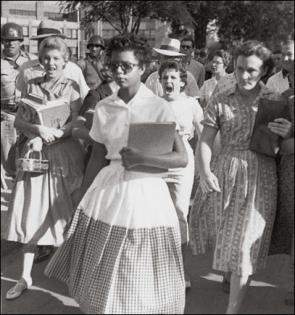In the two decades after World War II, legally sanctioned white supremacy faced a host of new challenges. The very idea that some races were biologically superior to others lost respectability and legitimacy in the wake of the racial genocide of the Holocaust. The Cold War with the Soviet Union where the United States proclaimed itself the leader of the “free world” highlighted the country’s failure to live up to its rhetoric about democracy and equality. African Americans intensified their struggle to gain full economic and political equality, both by challenging segregation laws in court and engaging in nonviolent protests to demand full equality. As these developments helped bring the “race problem” to the center of the national political agenda, federal courts began to take steps against government-sanctioned discrimination, reflected in Supreme Court rulings like the 1944 Smith v. Allwright decision, which ended the white primary, and Brown v. Board of Education, which declared segregation of public schools unconstitutional in 1954.
Although federal courts made no move to invalidate miscegenation laws in the 1940s or 1950s—indeed, a federal court in 1944 insisted that Oklahoma’s miscegenation statute did not violate the 14th Amendment—the new racial climate helped lay the foundation for the decision in Loving.
Hanna Arendt, a German philosopher who fled to the United States from Nazi Germany, publicly questioned why laws barring interracial were not falling before those barring other forms of segregation. To her mind, the right to marry was a basic human right “compared to which ‘the right to attend an integrated school” or “the right to sit where one pleases on a bus” were “minor indeed.”[1]


